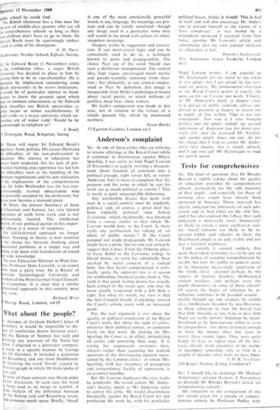What about the people?
: Apropos of Graham Hallett's letter (8 vember), it would be impossible to dis- ve all similarities drawn between every- rig the Bishop of Stepney has said and rything any associate of the Nazis has tten. I objected to a particular compari- made in a specific manner by George le (18 October). It included a quotation m Rosenberg and one from Huddleston, h featuring the word 'blood', capped by nal paragraph in which Mr Gale spoke of d spilt.
Ii none of these contexts was blood under ntific discussion. In each case the word being used as an image or symbol. A se analysis of the difference between t the Bishop said and Rosenberg wrote, Id consume much space. Briefly, 'blood' is one of the most emotionally powerful words in any language. Its meanings are pro- tean and can be totally unrelated—though any image used in a particular sense may still sound in the mind with echoes of other, unspoken meanings.
Imagery works by suggestion and associa- tion. It can short-circuit logic and can be consciously used to do so, a technique known to poets and propagandists. The classic Nazi use of the word 'blood' was such a deliberate manipulation. The central idea, kept vague, encouraged much mystic and pseudo-scientific nonsense from theo- rists; but ultimately, in any context empha- sised as Nazi by definition, this image is inseparable from Hitler's pathological mania about racial purity, to which millions of guiltless dead bear silent witness.
Mr Gale's comparison was made in this area, not in relation to the virtues of a simple peasant life, which he mentioned nowhere.






































 Previous page
Previous page